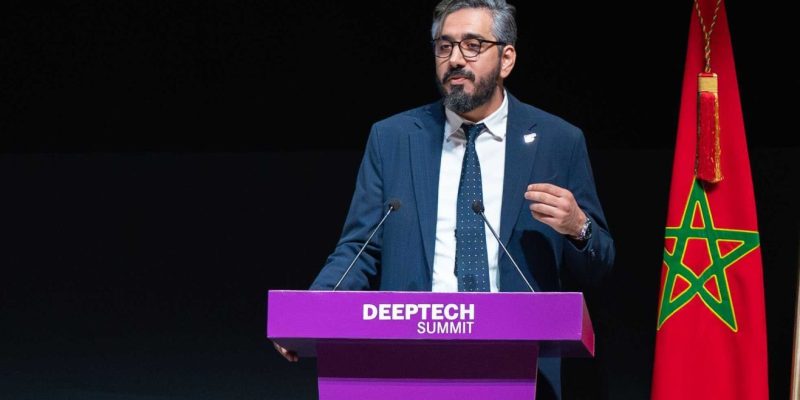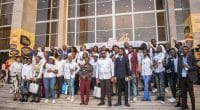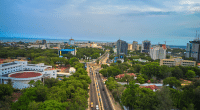The participants in the Bridge Africa Summit, which closed on 8 May in Morocco, extended their discussions until 10 May at another summit: DeepTech, organised by the Université Mohammed VI Polytechnique (UM6P). In this interview, Yassine Laghzioui, Managing Director of the UM6P Ventures investment fund, looks at the obstacles to the emergence of the entrepreneurial ecosystem, the involvement of women in innovation and the power of disruptive technologies to develop more sustainable cities in Africa.
Benoit-Ivan Wansi: The Bridge Africa Summit closed on 8 May and gave way to the DeepTech Summit, still organised by the Université Mohammed VI Polytechnique (UM6P). This event runs until 10 May, with the backdrop of accelerating innovative solutions. What role does UM6P Ventures play in this approach?
Yassine Laghzioui: UM6P Ventures is UM6P’s venture capital fund. Our mission is to invest in the best start-ups developing disruptive innovations and, more broadly, to help start-ups to grow, especially as the ecosystem in Africa is very new. This means that we are just taking the first step, despite positive growth in recent years. And we need players who can first give a good signal to our start-ups and entrepreneurs. Then we need to support them in accessing the network, accessing the market and structuring their businesses.
More and more Africans in Morocco are choosing Ben Guerir, not least because of “Startgate”, which is regarded as an American-style start-up campus. What’s your connection with Startgate? And what nationalities are represented?
There are a lot of venture capital funds in Africa. Sometimes the managers of these funds have trouble finding the right start-ups to invest in. And start-ups and entrepreneurs also complain about a lack of cash. In fact, the problem lies with development, maturation and so on.
Here, we welcome project leaders, even when they haven’t yet reached a certain level of maturity, so that we can prepare them for eventual investment. So Startagate, which is the university’s start-up campus, along with other initiatives such as the Fab Labs, the experimental farm, the research laboratories, 1337 and the Green Energy Park, is the UM6P Ventures biotope. In other words, UM6P Ventures is the incubator for future start-ups that will succeed in raising funds.
On the campus at Stargate, there are Cameroonians, Nigerians and even Ethiopians who come on acceleration and incubation programmes. Some people even call it Africa’s Silicon Valley, but I call it the phosphate of Africa’s valleys. This world is conducive to networking and mentoring.
What role do women play in this world of innovation?
We’re very proud to say that more than 50% of students are women and 30% of entrepreneurs. Personally, our goal is to have half of all start-ups run by women, or at least female co-founders. In fact, we’re starting to see more and more women taking up entrepreneurship as a serious career. Quite simply because women have more access to education in Africa than in the past.
The rigour and diversity that women bring to the table are the strength of our entrepreneurial ecosystem.
You have launched a call for applications to select start-ups in the agritech, health and greentech sectors. How does the process work and what support is planned for the candidates selected?
We launched this call for applications to send out the message that there is a venture capital fund that believes in Africa’s potential, that believes that the continent can position itself on the world stage of advanced and disruptive technology. Behind this, there is financial support in the form of an investment ticket of up to 7 million Moroccan dirhams (more than 700,000 euros), depending on the level of maturity. Despite the tight criteria, there has been an incredible response to the applications.
Managing a DeepTech start-up is very different from managing a traditional digital start-up. Clearly, a DeepTech entrepreneur needs to recruit and have access to a better network of experts in very specific, highly specialised fields. They need access to a network of mentors and cutting-edge laboratories where they can develop their product. They also need business support.
In your opinion, what are the main obstacles to the development of the start-up ecosystem in Africa? What can be done about them?
The whole world cannot develop economically without Africa. So today there is a growing awareness of this. One of the major obstacles for our start-ups on the continent is the difficulty of taking advantage of the depth of the African market. Africa is four times the size of the United States of America. In a few years’ time, we’ll have a billion and a half inhabitants, a huge market, but it’s not being activated because it’s so fragmented.
So it’s time to create free trade zones, simplify legislative approaches to enable these start-ups to work in synergy for a collective and powerful result.
The second challenge is the gap between the talent and the needs of start-ups. Today, 60% of Africa’s population is considered to be extremely young, especially those under the age of 25. This represents a huge workforce, but one that is not necessarily well trained to meet the needs of start-ups, in terms of technology, business and commercial aspects, etc. So there is a real need to train people who are capable of meeting the needs of start-ups. So there’s a real need to accredit our educational systems to enable these young people to find work with start-ups. They need them to ensure their growth. We don’t have to have universities everywhere, but we can use the magic of e-learning and digital platforms to meet this challenge.
The third challenge currently holding back the growth of African start-ups is the lack of infrastructure, whether in terms of logistics, electrification, laboratories or cutting-edge research. There is a huge impact when researchers, innovators and entrepreneurs are given the right resources. What they can produce in this case is much greater than when they don’t have it. One of the keys is to open up to the international capital market, because every dollar invested in Africa will have a knock-on return.
Technology is virtually inescapable these days and is making inroads into every sector of the economy. Do you think they are an essential lever for the resilience of territories in the fight against climate change?
Climate change is a scourge that cannot be tackled without the intervention of technology and disruptive technologies, including digital technologies. That’s why billions of dollars are invested every year. On the Green Tech front, we are focusing on developing new sources of green energy. In terms of water tech, we are exploring unconventional sources, particularly waste water treatment, because these days the stakes are much higher than simply making traditional investments to solve these problems. We take into account the fact that a production plant needs advanced technologies to limit greenhouse gas (GHG) emissions.
As far as agriculture is concerned, digital technologies are essential for sequestering and capturing carbon, and we have several start-ups dedicated to this.
Name one
There’s Atarec, for example, which is developing a system for generating green energy using mechanical wave energy. It’s a highly advanced technology with a team that can export its know-how internationally.
At a time when the local policies of some cities are almost powerless in the face of economic and environmental challenges, do you think it is still possible, thanks to African start-ups, to turn things around?
Yes, innovation start-ups have a major role to play in putting in place effective, efficient local policies that can keep pace with the exponential acceleration of urbanisation in Africa. This rapid urbanisation (the urban population is expected to triple in Africa between now and 2050, editor’s note) cannot be managed without recourse to advanced technologies, without having cities that are connected, without using digital platforms, and so on. The UM6P firmly believes in this.
What about smart cities?
One of the first programmes we launched focused on the smart city. This led to the emergence of some very fine start-ups, including “We go”, which uses an integrated platform to give citizens in a given area access to an integrated transport solution, i.e. to get from point A to point B in a large city. The platform lets you know which route, which technology and which means of transport you are going to use. It’s already up and running in the towns of Nador and Safi. The project will soon be extended to larger, more strategic urban centres (in Morocco) before being exported to other cities in Africa.
Which Moroccan city fascinates you?
The city I love most in Morocco is Marrakech (less than an hour and a half from Ben Guerir, editor’s note). If we were to draw an analogy, I’d say that Marrakech is a beautiful metropolis where tradition meets evolution, where the spirit of Africa meets technological development and avant-gardism. I think this is important, because Africa cannot develop without its roots. When we talk about DeepTech, it’s by no means a question of abandoning our culture, but of mixing it with a bit of modernity. Without roots, a tree cannot survive.
Interview by Benoit-Ivan Wansi, special envoy in Morocco







